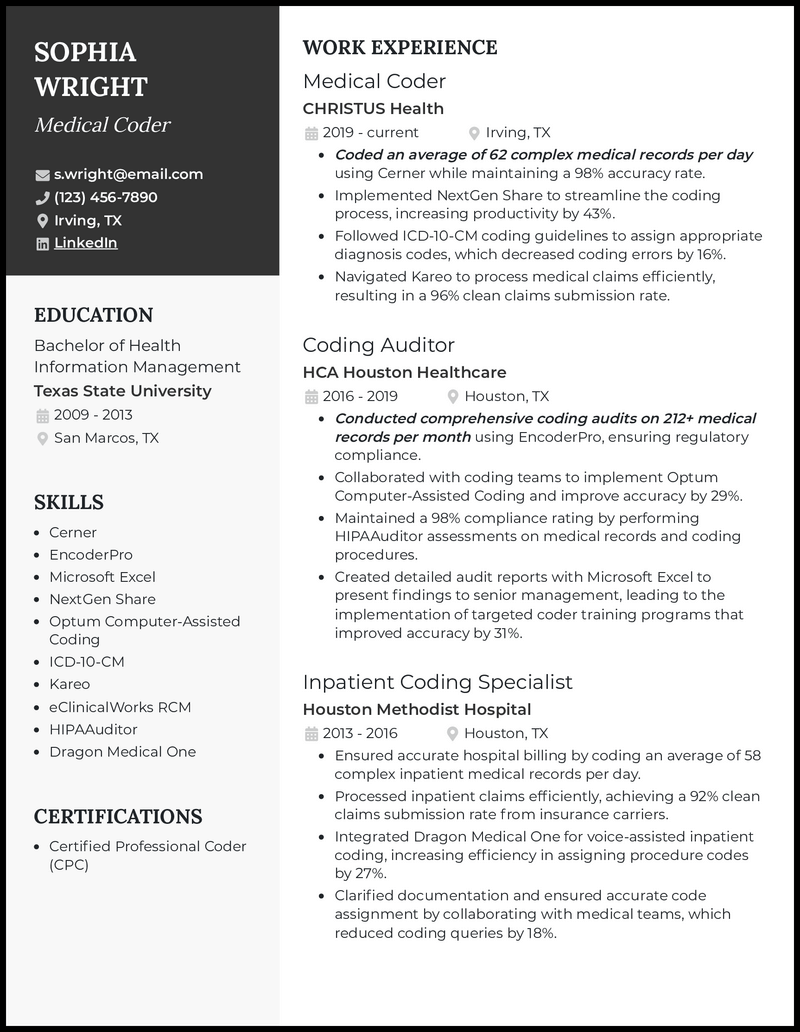Compliance and data accuracy are essential for medical organizations to get the best results for patients. That’s why pros like you are needed to identify documentation deficiencies, analyze treatment results, and provide the right data in the treatment process.
Have you reviewed your resume to ensure it meets each medical organization’s needs? Does your resume template help highlight your achievements and skills?
Since your work can significantly impact patient success, hiring managers will perform in-depth overviews of resumes to choose the best applicants to interview. We’ll help you stand out with cover letter writing tips and our medical coder resume examples that are landing many jobs in 2026.
Why this resume works
- There are two A’s that your medical coding resume will be incomplete without—Accuracy and Auditing. Now, instead of rambling about how many audits/reports you were doing in the past, prove the quality of them by listing the best tools.
- Mention industry-leading software like Cerner and Microsoft Excel to show that you’re well-versed in outputting high-quality medical records for all patients.
Related resume examples
What Matters Most: Your Medical Coder Skills & Work Experience

The job skills needed for medical coders can vary depending on the organization and the type of patients they treat. For example, one organization may need coders to help with billing, whereas another needs assistance with CPT coding.
To optimize, review the job description to ensure you choose the right skills for each company you apply to. It’ll ensure you stand out whether you’ll be using Quadax or Meditech systems in daily processes.
Here are some of the best medical coder skills to list on your resume.
9 best medical coder skills
- HIPAA
- CPT Coding
- ICD-10
- Medical Billing
- Claims Submissions
- Quadax
- Meditech
- Quality Assurance
- HCPCS
Sample medical coder work experience bullet points
While medical billing and quality assurance skills will stand out, medical hiring teams will still want to see more, so they’re sure you’ll be successful.
Knowing how many metrics are used in medical environments, you can optimize your work experience examples by including the right numbers, such as accuracy or compliance rates.
Also, ensure the examples you list are actionable achievements rather than just job duties. For example, rather than saying you were “in charge of claims submissions,” try for something more impactful, such as “reviewed over 300 weekly claims submissions using Quadax to ensure 99% accuracy.”
Here are a few samples:
- Followed ICD-10 coding standards to provide the proper diagnosis codes, boosting treatment accuracy by 26%.
- Conducted audits on 315 medical records using EncorderPro, boosting compliance with HIPAA standards by 48%.
- Created audit reports in Excel for review from medical office managers, boosting data efficiency by 59%.
- Implemented automated coding solutions with NextGen Share, saving 300 manual data entry hours and reducing monthly operational costs by $4,000.
Top 5 Tips for Your Medical Coder Resume
- Focus on technical skills
- Medical coding is a highly technical profession with high compliance standards. So, focusing on a technical skill set like ICD-10 coding and medical billing will help you stand out.
- Add action words
- Action words like “reviewed” and “analyzed” will make your examples more impactful. For instance, you could say you “reviewed over 500 records during quarterly quality assurance efforts to boost data accuracy by 38%.”
- Reverse chronological formatting works best
- Medical coding tools and standards are constantly evolving. For example, there has been an evolution from ICD-9 to new ICD-10 standards in today’s medical coding practices. So, listing your most recent coding experiences first will help you emphasize the most relevant skill set.
- Choose an organized template
- Think of your resume like you’re organizing reporting data for medical decision-makers. You’d want it to have clear headers, be well-spaced, and have bullet points with key information. Choose a resume template that presents your medical coding experiences similarly.
- Always proofread
- Your accuracy on the job will be vital when entering diagnosis codes and sending out billing documents. To show medical hiring managers you can maintain compliance, start things off right by proofreading to ensure your resume is grammatically correct throughout.
Limit your medical coding resume to three or four jobs. They should be the most recent and use a relevant skill set in aspects like CPT coding and claims submissions.
There are still many ways for inexperienced medical coders to stand out. You could list transferable skills from other jobs, like performing accurately as a data entry clerk. Additionally, educational achievements from your information management degree or while obtaining your CPC can provide more relevant abilities.
Inexperienced medical coders can often benefit from using a resume objective. For example, you could write a few sentences about how you’re an organized and motivated coding professional ready to apply your three years of data entry experience and knowledge of CPT coding to ensure the best results for patients.










